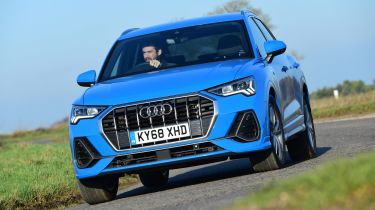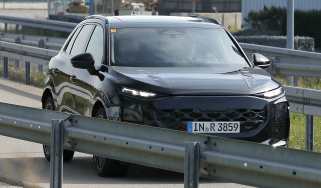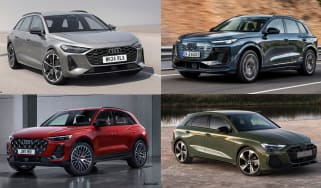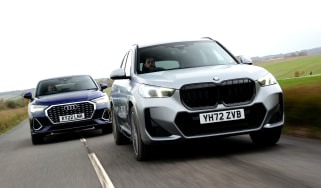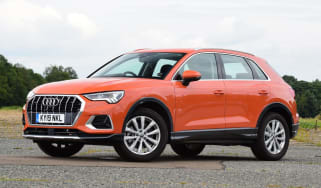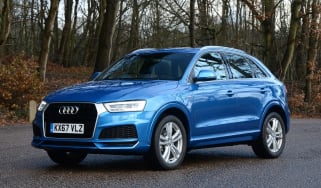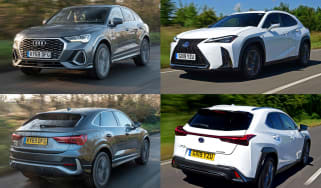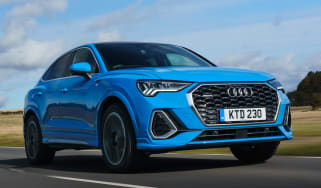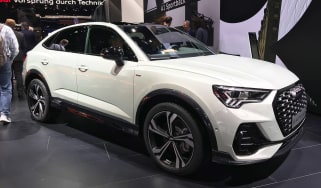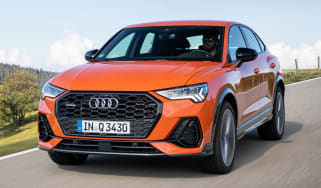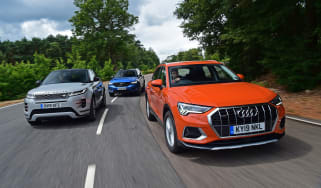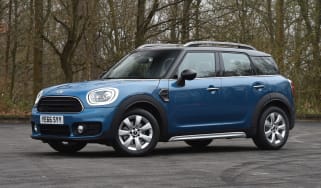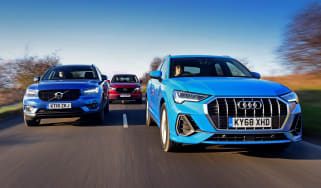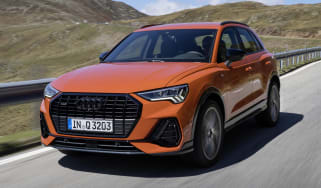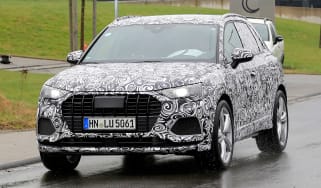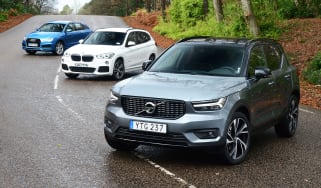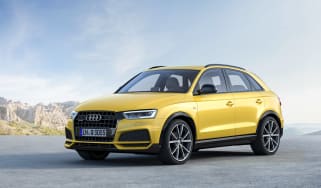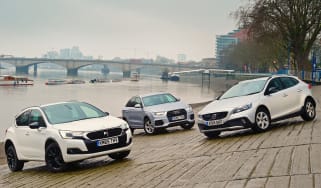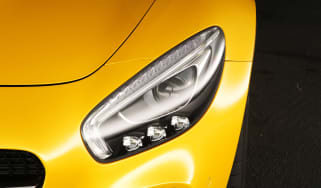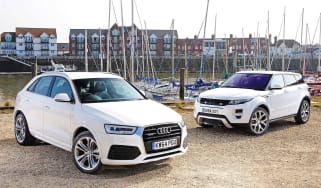Audi Q3 review
Premium quality and style, plus impressive practicality and class-leading tech, make the Audi Q3 an appealing small SUV

Audi’s trickle-down design philosophy may mean all its cars look similar, but fortunately it’s the cheaper ones that share the qualities of upmarket models and not vice-versa.
As a result, the Q3 is infused with much of the premium feel of its larger stablemates. It’s a characteristic that’s not just skin deep as the Q3 combines sharp styling with the latest technology, great build quality and excellent ride and handling.
About the Audi Q3
The Audi Q3 has been around in its present form since 2018, and while it didn’t move the game on much in styling terms from its predecessor, it did get a worthwhile tech upgrade including the adoption of Audi's Virtual Cockpit, which is the firm’s impressive digital instrument display.
Luckily there isn’t much wrong with the way most Audis look, and the Q3 has a lot more to offer beyond its typically premium style. It’s got a decent range of engines that are powerful and efficient, including the new 45 TFSI e hybrid option, and has a usefully practical cabin that’s also luxurious.
That sense of luxury is well heralded by the big Audi grille which gives the Q3 a strong presence on the road. In spite of its high-riding SUV stance there’s not much focus on off-road ability, but taking the Q3 anywhere off tarmac will be far from most owners’ minds. The Q3’s excellent road manners will be appreciated though, and while the BMW X1 offers a bit more driving involvement, Audi’s customers like the way their cars handle just fine. A less-than-slick manual gear change is a small fly in the ointment, but it’s unlikely to be a deal-breaker, especially as many will choose the S tronic auto option. Otherwise it’s quite tough to pick holes in the Q3’s approach.
Used - available now
The Audi Q3 is a one of the most important vehicles in the German marque’s line-up, given the growing reluctance of people to buy ‘ordinary’ saloons or hatchbacks when there’s a crossover/SUV on offer.
Compared to the preceding model, the latest Q3 has a restyled front grille with octagonal edges, new headlamps, and the car’s profile is taller, emphasising its crossover credentials. There’s a bit more pizazz to the exterior styling too, with bulging rear wheel arches that are similar to those of the A5 and A8 saloons.
A Q3 Sportback model is also offered which brings added style in the form of a steeply raked roofline, giving a coupe-like appearance over the standard Q3. The Sportback is 16mm longer than the Q3 on which it is based, and the roofline doesn’t affect practicality quite as much as you might imagine.
The latest version of the Audi Q3 is built on the VW Group’s MOB platform, which it shares with an increasing number of in-house stablemates. There’s only a single five-door bodystyle and five-seat cabin arrangement, but you do get a roomy boot.
There is a range of petrol and diesel engines, offering power outputs of 148bhp to 242bhp, while you can opt for a quattro four-wheel-drive powertrain and six-speed manual or seven-speed dual-clutch auto S tronic transmission. For those seeking extra performance, Audi also offers the RS Q3 with 396bhp. Company car drivers will be especially drawn to the Q3 TFSI e plug-in hybrid model, with its tax-busting 44-45g/km of CO2. The Q3 plug-in model shares its running gear with the VW Golf GTE and Tiguan eHybrid.
All models come with Audi’s hugely impressive Virtual Cockpit digital dash, alloy wheels and LED headlamps, while buyers have the option of Technik, Sport, S line and Black Edition trim levels, with the top-spec Vorsprung trim no longer offered in the standard range.
How much does the Audi Q3 cost?
The Audi Q3 starts from £35,380, with top-spec versions pushing up to £52,425. However, buyers can often find savings through AutoExpress’ recommended dealers, with cash prices starting from around £33,342. Finance options are available too, with monthly payments beginning at approximately £450. Looking at the used market, the Q3 can be picked up from as little as £16,475 through trusted AutoExpress partners.
Engines, performance and drive
The previous generation Audi Q3 was definitely compromised when it came to ride comfort, but this latest version is much improved. Even if you choose the big alloy wheels and lower suspension of the S Line, the car cushions bumps really well and in fact, offers one of the most comfortable rides in its class.
Adaptive damping was a standard feature on the now discontinued Vorsprung trim and is better still if you wish to track down a used example. However, the Sport suspension doesn’t crash over potholes, but it does ensure the body stays rigid and can cause an unsettling, bouncing sensation around town. It’s better the faster you go, smoothing out at motorway speeds.
The Q3 feels as stable on the road as you’d expect from an Audi, and body roll is well controlled during cornering. But while it has good turn-in response to steering inputs and terrific grip, it’s ultimately not as engaging to drive as a BMW X1. There’s a certain numbness about the Audi’s steering feel, which leaves you feeling less connected to the road.
Refinement is very impressive, and the Q3 is a great cruising machine, but the transmissions are a little bit of a let-down. The manual gearbox has a slightly clunky feel, while the seven-speed dual clutch S tronic auto is disappointingly slow to respond at times.
0-62mph acceleration and top speed
The entry-level petrol car is the 35 TFSI which uses a 148bhp 1.5-litre turbo, and comes with front-wheel drive and the choice of S tronic seven-speed auto or six-speed manual gearboxes. The 0-62mph time is between 9.2 and 9.6 seconds depending on spec.
There’s also a 2.0-litre petrol engine available in either 187bhp 40 TFSI or 227bhp 45 TFSI guise. They share quattro 4x4 running gear and a dual clutch auto transmission, reaching 62mph from rest in 7.4 and 6.3 seconds, respectively.
The 35 TDI and 40 TDI models share a 2.0-litre engine in 148bhp and 187bhp configurations, and acceleration figures are on a par with similarly rated petrols.
Somewhat ahead of the pack is the 394bhp RS Q3, which manages the 0-62mph sprint in 4.5 seconds. The new 45 TFSI e plug-in hybrid takes 7.3 seconds and has a top speed of 130mph.
MPG, CO2 and running costs
Fuel economy is respectable across the Q3 range although, of course, if you pick one of the hotter models and drive it hard, you can expect a penalty at the pumps.
The diesel engines are the most frugal, and the lower power 148bhp diesel found in the 35 TDI Technik will reach up to 56.5mpg on a WLTP test. The punchiest 187bhp diesel engine is capable of returning 42.8mpg - thanks to the 4x4 penalty.
CO2 ratings across the range are average at best. The 148bhp 35 TDI engine with the automatic S tronic gearbox offers the lowest emissions at 131g/km, although the 35 TFSI Sport auto version isn’t too far behind producing 146g/km of CO2. The highest ratings are unsurprisingly for the 40 TFSI and 45 TFSI which emit from 184g/km and 195g/km respectively.
If you opt for the new 45 TFSI e plug-in hybrid, you can look forward to cheaper company car Benefit-in-Kind tax thanks to its low 44-45g/km CO2 emissions, and if you keep the battery charged you'll get up to 31 miles in electric-only mode. Quoted fuel economy is 176.6mpg, but as soon as the battery runs down you can expect overall economy to plummet.
Insurance groups
The entry-level 35 TFSI in Technik specification falls into group 23 for insurance, which should mean reasonable premiums. Moving up through the range brings significantly more expensive insurance costs, however. The 227bhp 45 TFSI, in fashionable S line trim, sees a rise to group 33, while the same car with the top Vorsprung equipment level is in group 36.
Those spending between £50k-£60k on the RS Q3 model probably won't be put off by group 41-42 insurance.
Depreciation
The Audi Q3 will hold onto a decent chunk of its original value, retaining around 56-60 per cent of its original value over three years and 36,000 miles of ownership. The Sportback models fare a little better at 60-63 per cent.
To get an accurate valuation on a specific model check out our Free Car Valuation tool...
Interior, design and technology
Although it’s instantly recognisable as an Audi Q3, you don’t need to be too much of an Audi geek to spot the differences between this model and the last. This time around the car looks a little tougher with a taller profile, less rakish bonnet and more upright windscreen. Coupled with the more angular grille and boxy flared wheelarches, it definitely makes for a stronger presence on the road.
The interior will be far more interesting to owners of the old model though, as the formerly dated cabin has been replaced with a set-up that’s easily as good as anything else in the class. The core of the upgrade is Audi’s fantastic Virtual Cockpit display which replaces the traditional instrument pack with a colourful and feature packed TFT screen that’s a full 12.25 inches or 12.3 inches wide, depending on model.
You can configure the dash display with a range of driving and navigation info and graphics, while a second similarly large display in the middle of the dash deals with all the other infotainment and vehicle functions.
The car is built with Audi’s thorough attention to detail, and there’s a genuinely high-quality, precision feel to the way it’s put together, inside and out.
While the look and feel of the materials is faultless, the new cabin design can also be lifted with some interesting new trim options including Alcantara sections on the dashboard and door armrests. You can specify brown, grey or a vibrant orange which is an unusually playful touch for Audi.
Sat-nav, stereo and infotainment
The TFT screen-based dash looks pretty spectacular in the Audi Q3, and in top spec with MMI Navigation Plus you get the added benefit of an even wider display and full-colour Google Maps. The central touchscreen is impressive too, but does show up fingerprints quite badly.
The standard audio set-up is a six-speaker system with DAB, Bluetooth, Audi Smartphone Interface, and Audi Connect services subject to subscription.
Practicality, comfort and boot space
The new Audi Q3 is extremely comfortable over long journeys, thanks to its combination of spacious cabin, hushed refinement and compliant suspension, as well as the luxurious feel to the interior trim and comfortable seating – for all except the middle seat rear passenger who has to make do with a hard, high-set seat cushion. Passengers are well catered for with good sized door bins and oddment storage too, and there are a pair of cup-holders between the seats.
Dimensions and size
The latest Q3 is 18mm wider and 97mm longer than its predecessor, which may not sound much but is enough to make an appreciable difference to cabin space, especially for rear seat passengers. Overall the Q3 measures 4,484mm nose-to-tail and is 1,856mm wide and 1,616mm tall. The BMW X1 measures up at 4,438mm long, 1,821mm wide and 1,598mm tall. The style-led Sportback is 16mm longer than the Q3 on which it is based, meaning that roofline doesn’t affect practicality, too much.
Leg room, head room & passenger space
As it’s a little longer and wider than its predecessor, there’s a noticeable improvement to the Q3’s interior accommodation, and the seating arrangements are very practical too. There’s a typically impressive range of adjustment for front seat occupants, so every driver should be able to find a comfortable posture.
Rear seat occupants also benefit from a bench that slides backwards and forwards depending on luggage space requirements, while the backrest angle can be adjusted too. It’d be unfair to call the Q3 Sportback cramped in the back, but adults over six-foot tall may struggle to get comfortable. It feels a bit darker in the rear than some rivals, partly due to the taller window line, but also emphasised if you opt for the S line’s black headlining. A Sport model may be better served in this regard.
You don’t sit quite as high in the Q3 as in some rival SUVs, and indeed the seating position is slightly lower than in the old car. This means the view out isn’t quite as commanding either.
Boot Space
When the bench is pushed all the way forward, the Audi Q3 offers 675 litres of boot space, which reduces to 530 litres if you slide it right back to give your rear passengers maximum legroom. That still beats the Volvo XC40 and BMW X1, which offer 432 litres and 505 litres maximum boot spaces, respectively.
Fold the rear seats out of the way and luggage volume leaps up to 1,525 litres, again beating many rivals. Nice touches include LED spotlights in the tailgate, a parcel shelf you can stash under the floor, and the option of hands-free boot opening.
Reliability and safety
The Audi brand may have a positive premium image, but that may be counter-productive when it comes to setting high expectations for owners. In our 2022 Driver Power satisfaction survey, Audi came 22nd overall out of 29 manufacturers, well behind Lexus and BMW. The Q3 itself finished in 43rd spot on a 75-car list in the best cars to own poll. It didn't excel in any one area but should be good to live with.
Euro NCAP awarded the Q3 a full five-star rating after putting the small SUV through its crash testing programme. It achieved a 95 per cent score for adult safety and 86 per cent for child passenger protection.
The Q3 has an extensive roster of safety kit, including an autonomous emergency braking function, lane departure warning and lane-keeping assistance, as well as an optional intelligent adaptive cruise control system that not only keeps you a set distance from the car in front, but steers for you as well.
Warranty
Audi’s warranty offer lags behind its direct rivals BMW and Mercedes, because although you get three-year cover there’s a 60,000-mile cap on warranty claims. BMW and Merc offer unlimited mileage cover over the same three-year term, and of course some non-premium manufacturers are offering much longer warranties – up to seven years. You can extend the Audi cover, but that’s at extra cost.
Servicing
If you do a lot of miles your Q3 will tell you when it needs servicing, with intervals that shift depending on how you drive the car. Service intervals could be as far apart as 24,000 miles as the car’s onboard sensors check oil quality and notify the driver when it’s time for a pit-stop. Lower mileage drivers – less than 12,000 miles a year – will have annual checks.
Audi Q3 Alternatives
It competes in a hugely competitive market against the likes of the BMW X1, Mercedes GLA, Jaguar E-Pace and Volvo XC40 at the premium end of the crossover sector, but also has to attract buyers of more mainstream vehicles such as the Ford Kuga, Nissan Qashqai and Peugeot 3008. There are some strong rivals within the VW Group, too, namely the Skoda Karoq, SEAT Ateca and VW Tiguan.
More reviews
Car group tests
In-depth reviews
Which Is Best
Fastest
- Name45 TFSI 245 Quattro S Line 5dr S Tronic [Leather]
- Gearbox typeSemi-auto
- RRP£46,015
